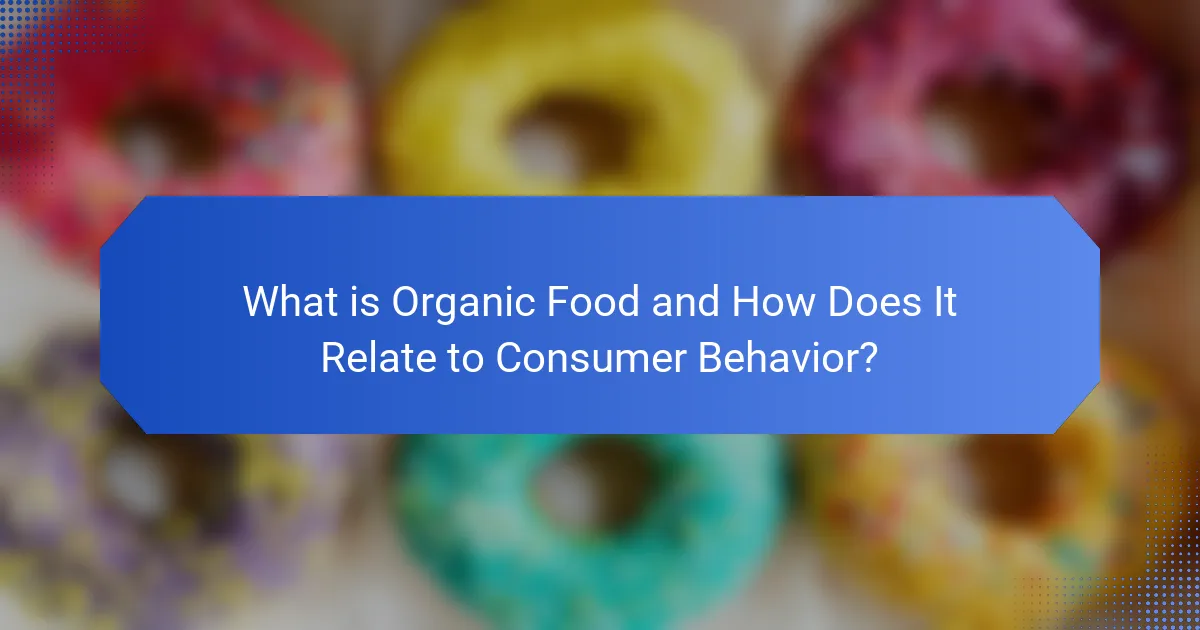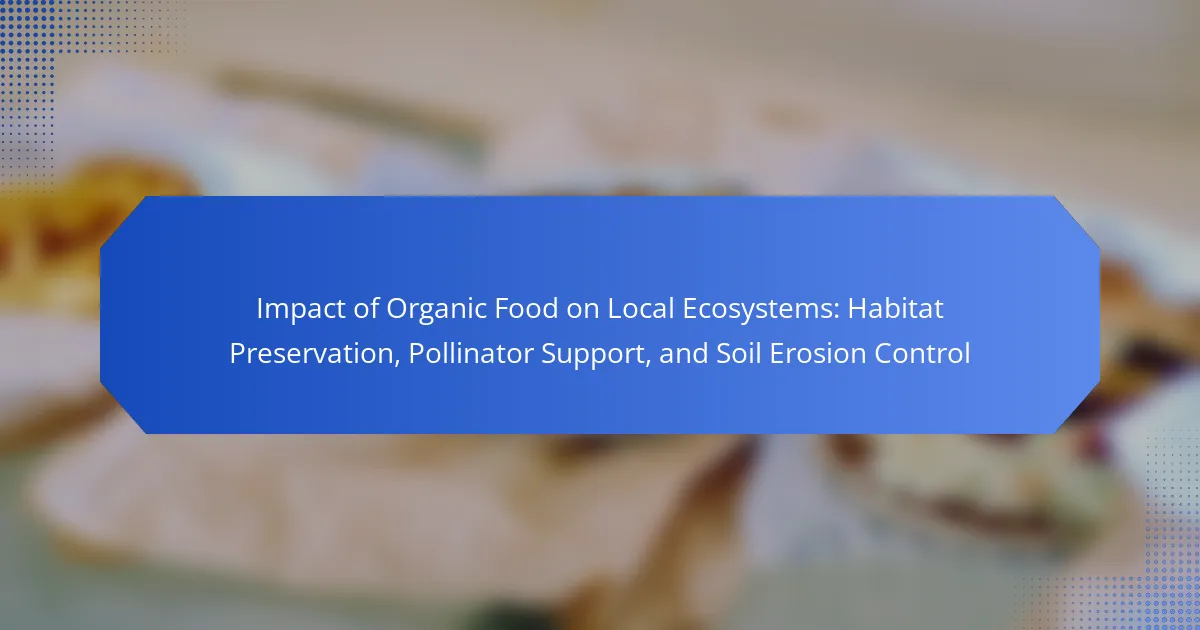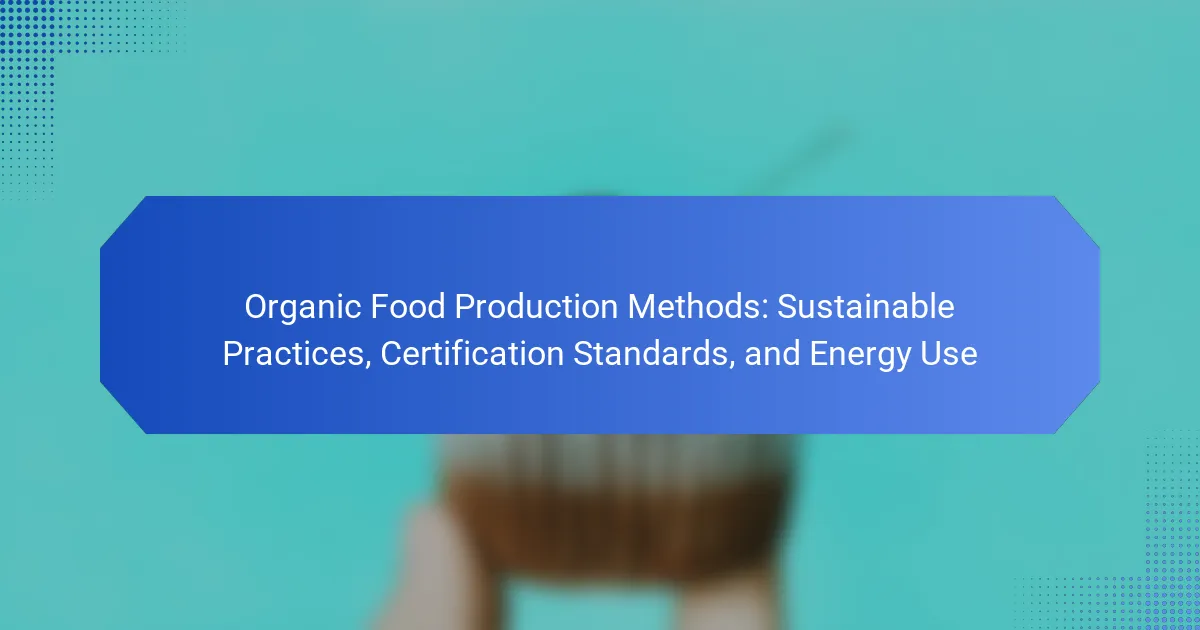Organic food is defined as agricultural products cultivated without the use of synthetic pesticides, fertilizers, or genetically modified organisms. This type of food is often viewed as healthier and more sustainable, with a growing consumer base that prioritizes health, environmental impact, and ethical considerations. Research indicates that 76% of consumers are willing to pay a premium for organic products, contributing to an annual market growth rate exceeding 10%. The article explores the relationship between consumer awareness, preferences, and purchasing trends in the organic food sector, highlighting the significant shift towards organic options in recent years.

What is Organic Food and How Does It Relate to Consumer Behavior?
Organic food refers to agricultural products grown without synthetic pesticides, fertilizers, or genetically modified organisms. This food is often perceived as healthier and more environmentally friendly. Consumer behavior towards organic food is influenced by factors such as health consciousness, environmental concerns, and ethical considerations. Studies show that 76% of consumers are willing to pay more for organic products. Additionally, the organic food market has seen a growth rate of over 10% annually in recent years. This indicates a significant shift in consumer preferences towards organic options.
Why is Organic Food Important in Today’s Market?
Organic food is important in today’s market due to its health benefits and environmental sustainability. Consumers increasingly seek foods free from synthetic pesticides and fertilizers. Research indicates that organic produce contains higher levels of antioxidants. A study published in the British Journal of Nutrition found that organic crops have 18-69% more antioxidants than conventional ones. Additionally, organic farming practices promote biodiversity and soil health. The global organic food market is projected to reach $620 billion by 2026, reflecting rising consumer demand. This trend highlights a shift towards healthier lifestyles and sustainable practices.
What are the key characteristics that define organic food?
Organic food is defined by specific agricultural practices that promote sustainability. These practices include the absence of synthetic pesticides and fertilizers. Organic food is also produced without genetically modified organisms (GMOs). Additionally, organic farming emphasizes crop rotation and biodiversity. The use of organic seeds is a requirement in organic farming. Organic livestock must be raised without antibiotics and growth hormones. Certification by recognized organizations ensures compliance with organic standards. According to the USDA, organic food must meet strict guidelines to be labeled as such.
How does organic food differ from conventional food?
Organic food is produced without synthetic pesticides, fertilizers, or genetically modified organisms (GMOs). Conventional food often utilizes these chemicals to enhance growth and yield. Organic farming practices promote biodiversity and ecological balance. For instance, organic farms often use crop rotation and composting to maintain soil health. In contrast, conventional farms may rely on monoculture and chemical inputs. Organic standards are regulated by organizations such as the USDA in the United States. These regulations ensure that organic products meet specific criteria for production and processing. Studies show that organic food can have higher levels of certain nutrients and antioxidants. Research indicates that consumers often choose organic food for health and environmental reasons.
How Do Consumers Perceive Organic Food?
Consumers perceive organic food as healthier and more environmentally friendly compared to conventional options. This perception is driven by beliefs that organic food contains fewer pesticides and chemicals. A study by the Organic Trade Association found that 82% of consumers believe organic food is better for their health. Additionally, many consumers associate organic products with higher quality and superior taste. Price sensitivity also plays a role; some consumers view organic food as a premium product. However, others may perceive organic food as a luxury, limiting its accessibility. Overall, consumer perception of organic food is influenced by health, environmental concerns, and socio-economic factors.
What factors influence consumer awareness of organic food?
Consumer awareness of organic food is influenced by multiple factors. These factors include marketing and advertising efforts. Effective marketing strategies can significantly enhance consumer knowledge. Education about health benefits also plays a crucial role. Research indicates that consumers often seek information about the nutritional advantages of organic products. Social influences, such as recommendations from friends and family, further impact awareness. Additionally, media coverage of organic food trends contributes to consumer familiarity. Accessibility and availability of organic options in stores also affect awareness levels. Finally, consumer perceptions of sustainability and environmental impact shape their understanding of organic food.
How does consumer education impact organic food preferences?
Consumer education significantly impacts organic food preferences by increasing awareness of health and environmental benefits. Educated consumers are more likely to understand the advantages of organic products. Studies show that informed individuals prioritize organic food for its perceived safety and nutritional value. According to a survey by the Organic Trade Association, 76% of consumers believe organic food is healthier. Additionally, consumer education influences purchasing behavior, leading to higher sales of organic products. The more consumers learn about sustainable farming practices, the more they prefer organic options. This trend is evident in market growth, with organic food sales reaching $61.9 billion in 2020, reflecting increased consumer interest driven by education.
What Trends Are Shaping Organic Food Purchasing Behavior?
Increasing health consciousness is shaping organic food purchasing behavior. Consumers are more aware of the health benefits associated with organic products. A survey by the Organic Trade Association found that 76% of Americans prioritize health when buying food. Sustainability concerns also influence purchases. Many consumers prefer organic food due to its environmental benefits. The same survey indicated that 54% of shoppers are motivated by sustainability. Additionally, the rise of online shopping is impacting organic food sales. E-commerce platforms are making organic products more accessible. This trend has been accelerated by the COVID-19 pandemic, which increased online grocery shopping by 30%. Lastly, younger generations are driving demand for organic food. Millennials and Gen Z are more likely to choose organic options compared to older generations. These trends collectively illustrate the evolving landscape of organic food purchasing behavior.
What demographic factors affect the purchasing of organic food?
Demographic factors significantly influence the purchasing of organic food. Key factors include age, income, education level, and family size. Younger consumers often show a higher preference for organic products. Higher income levels correlate with increased organic food purchases. Consumers with higher education tend to prioritize organic food for health benefits. Additionally, families with children are more likely to buy organic products for perceived safety. Research indicates that 50% of organic food buyers earn over $75,000 annually, demonstrating income’s role in organic purchasing behavior.
How do lifestyle choices influence organic food purchases?
Lifestyle choices significantly influence organic food purchases. Consumers who prioritize health often choose organic products for perceived benefits. Research indicates that individuals with a focus on sustainability are more likely to purchase organic foods. A study by the Organic Trade Association found that 76% of consumers buy organic for health benefits. Additionally, those who engage in fitness-related activities tend to favor organic options. This trend is supported by a survey from the Hartman Group, which showed that 55% of health-conscious consumers prefer organic. Overall, lifestyle choices shape purchasing behavior by aligning with values of health and sustainability.
How Do Awareness and Preferences Interact in Consumer Choices?
Awareness and preferences significantly interact in consumer choices by influencing decision-making processes. Awareness refers to consumers’ knowledge of products and their attributes. Preferences are the inclinations or desires for certain products over others. When consumers are aware of organic food options, they are more likely to develop preferences for these products.
Research indicates that increased awareness leads to higher purchasing intent. A study by Grunert et al. (2014) found that consumers who understand the health benefits of organic foods are more inclined to choose them. Awareness can also reduce perceived risks associated with unfamiliar products.
Thus, as awareness grows, so does the likelihood of preference formation, ultimately guiding consumer choices in the organic food market.
What are the Key Motivations Behind Choosing Organic Food?
Consumers choose organic food primarily for health benefits. Organic foods are perceived to be free from harmful chemicals and pesticides. Many consumers believe that organic food is more nutritious than conventional options. Research indicates that organic produce often contains higher levels of certain vitamins and antioxidants. Environmental concerns also motivate consumers; organic farming practices are viewed as more sustainable. Studies show that organic farming enhances biodiversity and soil health. Additionally, ethical considerations play a role; consumers often prefer organic food for animal welfare reasons. A survey found that 60% of organic consumers prioritize humane treatment of animals in their food choices. Lastly, taste is a significant factor; many consumers report that organic food tastes better than non-organic alternatives.
How do health concerns drive organic food consumption?
Health concerns significantly drive organic food consumption. Consumers increasingly associate organic foods with better health outcomes. Studies show that organic products often contain fewer pesticides and additives. This perception leads to a preference for organic options among health-conscious individuals. Research indicates that 76% of consumers believe organic food is healthier than conventional food. Additionally, concerns about foodborne illnesses have heightened interest in organic farming practices. The demand for organic foods continues to rise as people prioritize their health and wellness.
What role does environmental awareness play in consumer preferences?
Environmental awareness significantly influences consumer preferences. Consumers increasingly prioritize sustainability in their purchasing decisions. Research shows that 66% of global consumers are willing to pay more for sustainable brands. This trend indicates a shift towards eco-friendly products, including organic food. Additionally, consumers often associate environmental responsibility with product quality. Brands that promote sustainable practices tend to attract environmentally conscious buyers. The rise of green marketing strategies further reflects this preference. Overall, environmental awareness shapes consumer choices, leading to increased demand for organic and sustainable products.
What Are the Common Barriers to Purchasing Organic Food?
Common barriers to purchasing organic food include higher prices, limited availability, and lack of awareness. Higher prices deter many consumers, as organic products often cost 10-30% more than conventional options. Limited availability in certain regions restricts access to organic choices. A lack of awareness about the benefits of organic food can lead to consumer indifference. Additionally, some consumers perceive organic food as less convenient due to longer shopping times. Misconceptions about organic food’s nutritional value further complicate purchasing decisions. According to a study by the Organic Trade Association, 43% of consumers cite price as a significant barrier to buying organic.
How do price perceptions affect organic food buying decisions?
Price perceptions significantly influence organic food buying decisions. Consumers often associate higher prices with better quality and health benefits. Research indicates that 70% of consumers are willing to pay more for organic products due to perceived value. Conversely, negative price perceptions can deter purchases. For example, if organic products are viewed as too expensive, consumers may opt for conventional alternatives. A study by Thogersen and Zhou (2012) found that price sensitivity directly impacts organic food purchases. Thus, understanding price perceptions is crucial for marketers in the organic food sector.
What misconceptions exist about organic food that hinder purchases?
Misconceptions about organic food include beliefs that it is significantly more expensive, less nutritious, and often not worth the price. Many consumers think organic food is always much pricier than conventional options. However, studies show that price differences can vary widely based on location and product type. Some people believe organic food lacks nutritional benefits compared to non-organic food. Research indicates that the nutritional differences are minimal and often not statistically significant. Additionally, there is a misconception that organic food is always pesticide-free. In reality, organic farming uses certain approved pesticides, which can lead to confusion among consumers. These misconceptions can deter potential buyers from choosing organic options despite their potential benefits.
What Strategies Can Enhance Consumer Engagement with Organic Food?
Strategies to enhance consumer engagement with organic food include education, transparency, and community involvement. Educational campaigns can inform consumers about the health benefits of organic food. Studies show that knowledgeable consumers are more likely to purchase organic products. Transparency in sourcing and production builds trust. Brands that share their supply chain details see increased loyalty. Community involvement fosters a sense of belonging. Local events and farmers’ markets encourage direct interaction with producers. Social media engagement allows brands to connect with consumers in real-time. Research indicates that brands active on social platforms have higher engagement rates. Overall, these strategies create a deeper connection between consumers and organic food.
How can marketing efforts improve awareness of organic food benefits?
Marketing efforts can improve awareness of organic food benefits through targeted campaigns and educational content. These strategies can highlight the health advantages of organic foods, such as reduced pesticide exposure and higher nutrient levels. Research shows that consumers are more likely to choose organic products when they understand their benefits. For instance, a study by the Organic Trade Association found that 82% of consumers believe organic food is healthier. Social media platforms can amplify these messages, reaching broader audiences effectively. In-store promotions and tastings can also engage consumers directly, enhancing their understanding of organic foods. Overall, consistent messaging across various channels elevates consumer awareness and drives purchasing decisions.
What role do social media and influencers play in shaping preferences?
Social media and influencers significantly shape consumer preferences. They create awareness about products, including organic food options. Influencers often share personal experiences, making them relatable to followers. This relatability builds trust and credibility. Research indicates that 70% of teens trust influencers more than traditional celebrities. Social media platforms amplify these messages, reaching vast audiences quickly. User-generated content also encourages engagement and community discussions. Consequently, social media and influencers directly impact purchasing decisions in the organic food market.
What Practical Tips Can Help Consumers Make Informed Organic Food Choices?
To make informed organic food choices, consumers should prioritize understanding labels. Look for certifications like USDA Organic, which indicates compliance with strict organic standards. Research the brands and farms behind products to ensure transparency. Compare prices and quality among different stores to find the best value. Seasonal produce is often fresher and more affordable, so consider purchasing local organic options. Educate yourself about the environmental impact of organic versus conventional farming. Join community-supported agriculture (CSA) programs for direct access to organic produce. Stay updated on organic food trends and research to make better choices.
Organic food is defined as agricultural products grown without synthetic pesticides, fertilizers, or genetically modified organisms, and is increasingly perceived as healthier and more environmentally friendly. The article explores consumer behavior towards organic food, highlighting key factors such as health consciousness, environmental concerns, and ethical considerations that drive purchasing decisions. It discusses the growth of the organic food market, the characteristics that differentiate organic from conventional food, and the impact of consumer education and awareness on preferences. Additionally, it examines demographic influences, common barriers to purchasing, and effective strategies for enhancing consumer engagement with organic products.



